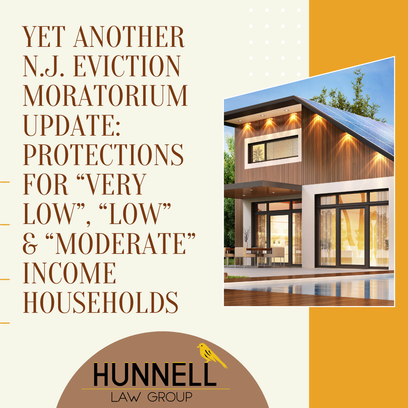|
8/18/2021 New COVID-19 Related State Legislation: ANOTHER Eviction Moratorium Update & Utility Assistance for TenantsRead NowBy Ryan Westerman, Esq.
Governor Murphy recently signed Senate Bill No. 3691, appropriating $750 million in federal funds to provide rental and utility assistance for qualifying New Jersey residents: $500 million is allocated for rental assistance, and the remaining $250 million is for utility assistance. The programs are administered by the New Jersey Department of Community Affairs. The law adds new limits on who is protected by eviction moratorium. New Jerseyeans with household incomes below 120% of the Area Medium Income (a/k/a/ AMI, where “Area” refers to the county the resident lives in) will continue to be protected from eviction through August 2021. New Jerseyeans with incomes below 80% AMI are protected until January 1, 2022. Continuing reading for additional details. Other highlights of the bill, as summarized by Governor Murphy’s office include:
Do you think you qualify for any of these protections or need assistance in complying with these requirements? Schedule a strategy session with the Hunnell Law Group today!
0 Comments
8/9/2021 Recent NJ Appellate Decision Chips Away at Eviction Moratorium Protections: Talmadge Village, LLC. v. Keith WilsonRead NowBy Ryan Westerman
On July 1, 2021, the New Jersey Appellate Decision issued a decision in the case of Talmadge Villages LLC v. Keith Wilson, Docket No. A-0590-20 (App. Div. 2021. The court published the decision thereby making it precedent for similarly situated cases that are currently pending or may arise in New Jersey Superior Court. The issue before the Court was whether the trial court erred in staying a previous order, preventing the ejectment of the defendant based on Governor Murphy’s Executive Order 106, forbidding evictions in response to the COVID pandemic. Plaintiff argued Executive Order 106 does not apply to the defendant in this case due to the absence of a landlord/tenant relationship. Plaintiff argued the defendant was a “squatter” by legal definition and thereby not entitled to the protected afforded by the moratorium. The Court agreed: “Because we do not believe the governor’s moratorium on eviction extends to persons having the legal status of squatter, we vacate the stay.” The facts of the case are relatively simple. The defendant’s girlfriend resided in an apartment owned by plaintiff. She declined to renew her lease and vacated the property. Plaintiff learned defendant took residence of the property during an inspection of the premises, then issued a written demand to vacate. The defendant was never party to the previously existing lease (only his girlfriend was) nor did he ever pay plaintiff rent. The trial court issued an order for possession in plaintiff’s favor, ordering defendant to vacate. The judge then put a legal stay on the enforcement, citing Executive Order 106 as the legal justification. In effect, the defendant was allowed to stay in the apartment until the eviction moratorium ended. Plaintiff appealed. The Appellate Court reversed the trial court’s stay: Since defendant neither rented nor owned the subject premises when the trial court issued its…order, and plaintiff sought defendant’s removal from the residential property by way of ejectment, rather than an eviction or foreclosure proceeding, we are convinced defendant’s removal from the apartment was not barred under Executive Order 106. From a legal standpoint, the Appellate Court has solid legal justification for its ruling by distinguishing “ejection” from an “eviction”. Executive Order 106 is absent any ejectment language, creating a loophole for plaintiffs to recover occupied property through an ejectment procedure. With the same pen stroke however, the Court also slashed at the public policy behind the Order 106: …housing security and stability are important to public health, particularly as homelessness can increase vulnerability to COVID-19; and…removals of residents pursuant to evictions or foreclosure proceedings can increase the risk to those residents of contracting COVID-19, which in turn increases the risks to the rest of society and endangers public health. Read the Appellate Court’s full decision here. 8/2/2021 Yet Another N.J. Eviction Moratorium Update: Protections For “Very Low”, “Low” & “Moderate” Income HouseholdsRead Now By Ryan Westerman Because the flurry of legislation, executive orders, changes to that information, and the confusion surrounding the eviction moratorium over the last 16 months just hasn’t been enough for renters, the State’s legislatures passed new a bill this week. Curiously, the new bill bifurcates protections from a previous bill signed into law mere weeks ago, which extended the eviction mortarium until January 1, 2022. Bill s3691 mirrors the eviction protections from the most recent law (which statutorily codifies Governor Murphy’s Executive Orders from 2020) for “very low”, “low”, and “moderate-income” households. The bill defines very low income households as those earning annual income of 30% or less of the county’s median income; low income households earn 50% or less; moderate-income households earn more than 50% but less than 80%. Any household that earns more than 80% of their county’s median income will only be shielded from evictions until August 31st when and if the bill becomes law. The measure passed both of the State’s legislative bodies without any no votes. Pretty unprecedented given the divisive political climate. The bill now sits on the Governor’s desk. Murphy is vocal about the renters’ need for government support, made clear when he signed legislation extending the moratorium until January 1, 2022. Now, his veto of the bill will be purely ceremonial based on the voting track record of both State Senate and Assembly members. Both chambers’ votes this week are clear indication of what lies ahead. Bill s3691 makes further distinctions amongst renters. Notably, those renters whose inability to pay rent is COVID related, and those whose are not. In debt renters that fell behind for other reasons will no longer receive pandemic protection and will face eviction. This appears to strike a reasonable balance between the landlords’ needs to collect rent revenue to sustain their businesses, and the public health concern of making the most financially vulnerable sections of the population homeless, as vaccination rates rise and the pandemic peters out. What it does not do is provide any solution for the tens of thousands of New Jerseyans facing eviction in 6 months of time, but merely kicks the can down the road … all the way into 2022. |
Details
Contributors:Stephanie Hunnell, Esq. , Ryan Westerman, Esq. and Caitlin Holland, Esq. Archives
April 2024
Categories
All
|
|
Hunnell Law Group, LLC is conveniently located at 908 Main Street., Asbury Park, NJ 07712
You can contact us at 732-749-3500 or by facsimile at 732-749-3503 Attorneys serving Asbury Park, Avon-by-the-Sea, Belmar, Manasquan, Bradley Beach, Freehold, Toms River, Fair Haven, Red Bank, Manalapan, Marlboro, New Brunswick, Jackson Township, Brick, Howell, Asbury Park, Ocean Township, Eatontown, Wall Township, Neptune City, Neptune Township, Spring Lake, Wanamassa, Lake Como,
Monmouth County, Ocean County, Middlesex County, and Mercer County, in Central New Jersey. |
© 2019, 2020, 2021, 2022, 2023 Hunnell Law Group, LLC, all rights reserved. Disclaimer & Site Map & Privacy Policy.
No aspect of this advertisement has been approved by the Supreme Court of New Jersey.

 RSS Feed
RSS Feed